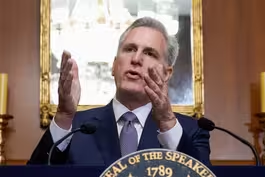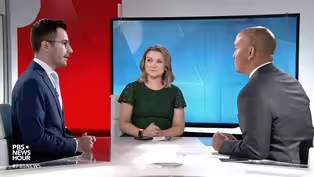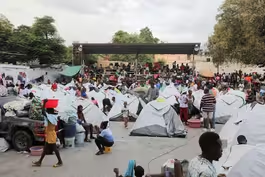
Child care centers scramble as pandemic-era funding expires
Clip: 10/2/2023 | 5m 36sVideo has Closed Captions
Child care centers face funding gap as pandemic-era grants expire
Key funding for child care centers dating back to the pandemic ended on Saturday. More than 220,000 centers counted on those grants to help pay the bills and raise wages. With the loss of funding, one progressive think tank projects that as many as 70,000 facilities could close in the long run. Stephanie Sy discussed the ramifications with Julie Kashen.
Problems playing video? | Closed Captioning Feedback
Problems playing video? | Closed Captioning Feedback
Major corporate funding for the PBS News Hour is provided by BDO, BNSF, Consumer Cellular, American Cruise Lines, and Raymond James. Funding for the PBS NewsHour Weekend is provided by...

Child care centers scramble as pandemic-era funding expires
Clip: 10/2/2023 | 5m 36sVideo has Closed Captions
Key funding for child care centers dating back to the pandemic ended on Saturday. More than 220,000 centers counted on those grants to help pay the bills and raise wages. With the loss of funding, one progressive think tank projects that as many as 70,000 facilities could close in the long run. Stephanie Sy discussed the ramifications with Julie Kashen.
Problems playing video? | Closed Captioning Feedback
How to Watch PBS News Hour
PBS News Hour is available to stream on pbs.org and the free PBS App, available on iPhone, Apple TV, Android TV, Android smartphones, Amazon Fire TV, Amazon Fire Tablet, Roku, Samsung Smart TV, and Vizio.
Providing Support for PBS.org
Learn Moreabout PBS online sponsorshipAMNA NAWAZ: Some key funding for childcare centers dating back to the pandemic ended on Saturday.
Stephanie Sy has more on what that means for families.
STEPHANIE SY: More than 220,000 childcare centers in the U.S. received these grants to help pay the bills and raise wages for staff during the pandemic.
The temporary aid amounted to $24 billion.
With the loss of funding, one progressive think tank projects that as many as 70,000 facilities could be forced to close in the long run, affecting more than 3.2 million children.
In the near term, parents may see higher childcare costs and fewer classrooms.
To help us understand the ramifications, I'm joined by Julie Kashen, senior fellow and director for women's economic justice at The Century Foundation, which published that estimate.
Julie Kashen, thank you for joining the "NewsHour."
So you put out that survey in June that estimated that tens of thousands of these childcare for facilities might close.
Which operations are the most vulnerable to closure in the face of this funding loss?
JULIE KASHEN, The Century Foundation: The childcare programs that are in states that haven't put additional funding in are definitely at risk.
Family childcare homes, these are home-based childcare that do generally serve fewer kids, but more conveniently in the communities, those are programs that are often more at risk, because what childcare providers who run those end up doing is, their first option is to stop paying themselves a salary to go into personal debt, not great options.
And so they're likely to be more at risk than other programs, although the reality is, childcare providers do this work because they love children, because they want to serve parents in their community, and so most of them are going to do everything they can to keep their doors open.
So, as you said, they will first raise their rates.
They will then serve fewer kids or close a classroom, and then closures will be a last resort.
And this may take some time.
We have already gone over the cliff, right?
The deadline has passed.
But the impacts of that will be felt over a long period of time for months to come.
STEPHANIE SY: Right.
And, apparently, some of the impacts may -- already being felt as far as the rise in tuition.
The Labor Department reported recently that the average national price of day care and preschool services rose 6 percent in July from a year earlier.
How much of that would you attribute to day cares preparing for the loss of these federal grants?
And how will parents manage?
JULIE KASHEN: I think smart childcare providers have really been thinking about what their budget is and have already started to account for that by raising prices.
At the same time, any parent who's paid for childcare knows it's expensive.
Childcare can cost $10,000, $15,000, $20,000 a year, depending on the age of your child and what community you live in, what type of childcare you choose.
So it's already really expensive.
Parents are already paying at the top of their budget for childcare.
So these price increases are really going to be problematic.
STEPHANIE SY: I'm curious how you see these rising costs affecting working parents, especially working mothers, whether we will see, for example, impacts on the labor force, women having to stay at home because they simply can't afford the rising costs of childcare.
JULIE KASHEN: We do expect that parents will be impacted and that the majority of the impact will be on moms.
That means that they're going to shift their hours around, cut their hours, or ultimately have to leave the work force.
And that has impacts on their families.
That has impacts on their own future earnings and on whole communities.
The Century Foundation report found that about $9 billion a year could be lost in parents' earnings as a result of the tough choices that they're going to have to make.
STEPHANIE SY: Some are saying that the notion that this is a childcare cliff is somewhat hyperbole, because, as you point out, a lot of states have put solutions in place to address the loss of this federal assistance.
Can you give us a sense of how many states have that plan and how many states have done nothing?
JULIE KASHEN: About 15 states have put in dollars that will really make a difference in terms of the stabilization.
None of it is enough to kind of really stabilize the sector the same way, but it will help in those states in a significant way.
And a lot of states then haven't also, right?
We have already seen, in Wisconsin, 42 providers have shut down, and others have raised their rates.
So we're seeing it really depends on the state.
One of the things to know, though, is that the sector was precarious before anyone ever occurred of COVID-19.
This is an area that Treasury Secretary Janet Yellen has called a broken market, a textbook example of a broken market.
It does not work.
Parents are asked to pay at the top of their budget.
Providers are having to pay early educators poverty level wages because there's just not enough money in the system.
We don't ask parents to pay the full freight for a fourth grade class, but we do ask them to do that for infants and toddlers.
This stabilization money showed us what life could be like if we actually partnered with government and families to make it all work.
STEPHANIE SY: Julie Kashen with The Century Foundation, thank you so much for joining the "NewsHour" with your insights.
JULIE KASHEN: Thank you.
GEOFF BENNETT: And our thanks to Stephanie Sy.
How a medical center harmonizes health and performing arts
Video has Closed Captions
Clip: 10/2/2023 | 6m 56s | How a Houston medical center is harmonizing health and performing arts (6m 56s)
The major cases on the docket as Supreme Court begins term
Video has Closed Captions
Clip: 10/2/2023 | 5m 52s | The major cases on the docket as Supreme Court begins new term (5m 52s)
McCarthy faces revolt from far-right after avoiding shutdown
Video has Closed Captions
Clip: 10/2/2023 | 3m 2s | McCarthy faces revolt from far-right Republicans after deal to avoid government shutdown (3m 2s)
Tamara Keith and Andrew Desiderio on McCarthy's future
Video has Closed Captions
Clip: 10/2/2023 | 7m 21s | Tamara Keith and Andrew Desiderio on what's next for the House and McCarthy's speakership (7m 21s)
Trump's empire in question during New York civil fraud trial
Video has Closed Captions
Clip: 10/2/2023 | 6m 52s | Trump's business empire in question during New York civil fraud trial (6m 52s)
UN will send police force to Haiti to fight gang violence
Video has Closed Captions
Clip: 10/2/2023 | 6m 31s | UN to send international police force to Haiti to combat rising gang violence (6m 31s)
Veteran exposed to burn pits wins precedent-setting lawsuit
Video has Closed Captions
Clip: 10/2/2023 | 6m 35s | Veteran exposed to toxic burn pits wins precedent-setting lawsuit (6m 35s)
Providing Support for PBS.org
Learn Moreabout PBS online sponsorship
- News and Public Affairs

FRONTLINE is investigative journalism that questions, explains and changes our world.

- News and Public Affairs

Amanpour and Company features conversations with leaders and decision makers.












Support for PBS provided by:
Major corporate funding for the PBS News Hour is provided by BDO, BNSF, Consumer Cellular, American Cruise Lines, and Raymond James. Funding for the PBS NewsHour Weekend is provided by...






